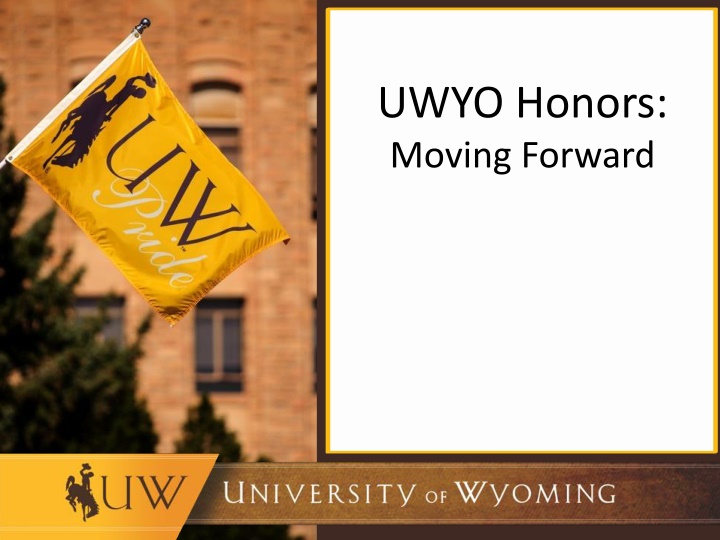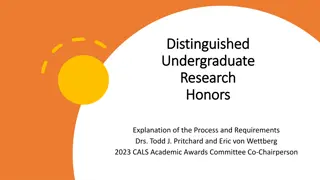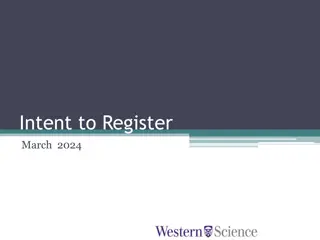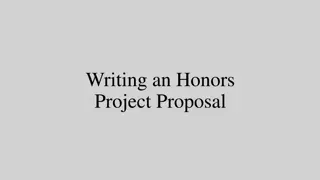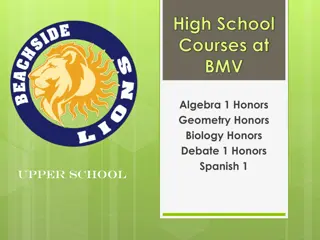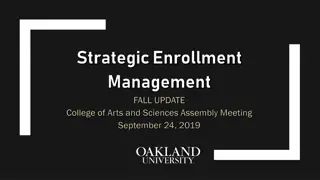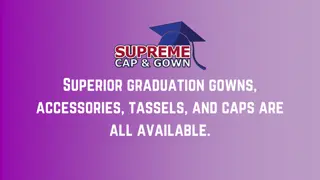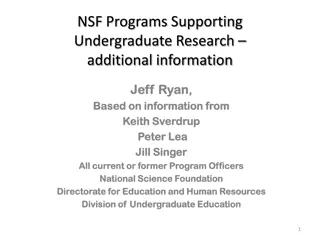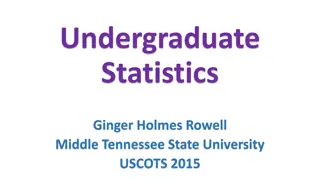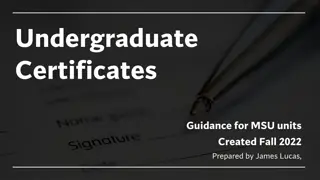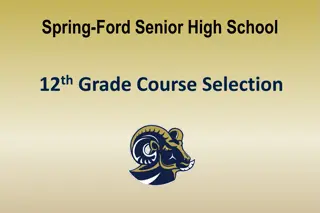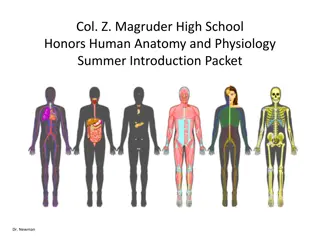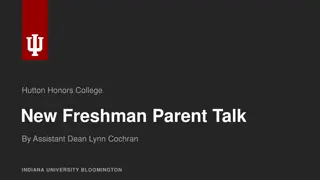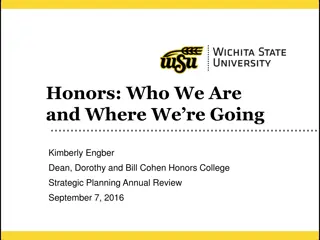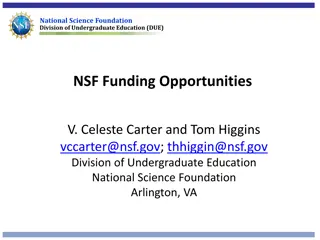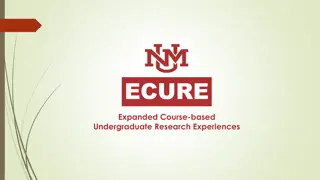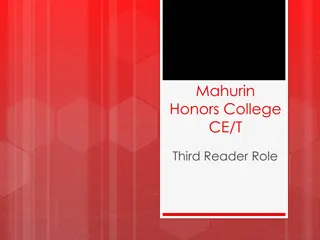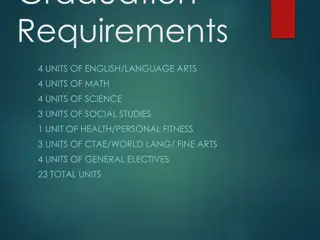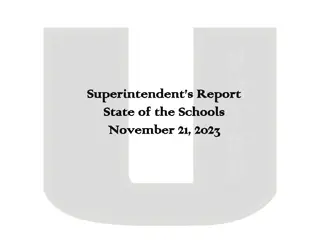Honors College: Enhancing Undergraduate Education with High Impact Practices
Enhance undergraduate education through the implementation of High Impact Practices (HIP) in the Honors College, fostering engagement, academic success, and holistic student development. With initiatives like first-year experiences, diverse learning communities, and collaborative projects, the Honors College aims to position students for academic excellence by increasing interactions with faculty, feedback, and real-world relevance.
Download Presentation

Please find below an Image/Link to download the presentation.
The content on the website is provided AS IS for your information and personal use only. It may not be sold, licensed, or shared on other websites without obtaining consent from the author.If you encounter any issues during the download, it is possible that the publisher has removed the file from their server.
You are allowed to download the files provided on this website for personal or commercial use, subject to the condition that they are used lawfully. All files are the property of their respective owners.
The content on the website is provided AS IS for your information and personal use only. It may not be sold, licensed, or shared on other websites without obtaining consent from the author.
E N D
Presentation Transcript
UWYO Honors: Moving Forward
Recruitment Of the 18 schools, listed by the College Board as our major competitors for high achieving students, 11 have Honors Colleges As universities seek to attract high-achieving students, the move to an Honors College has become a national trend.
Enriched Undergraduate Experience The Honors College would infuse and formalize High Impact Practices (HIP) throughout the Honors experience. HIP, as defined by the Association of American Colleges and University (AAC&U), are teaching and learning practices widely tested and... shown to be beneficial for college students from many backgrounds, especially historically underserved students, who often do not have equitable access to high-impact learning. AAC&U
HIP Defined First-Year Experiences Common Intellectual Experiences Learning Communities Writing-Intensive Courses Collaborative Assignments and Projects Undergraduate Research Diversity/Global Learning Service Learning, Community-Based Learning Internships Capstone Courses and Projects
Markers of HIPs Done Well Expectations set at appropriately high levels Significant investment of time and effort Interactions with faculty and peers Experiences with diversity Frequent and constructive feedback Periodic and structured opportunities for reflection Relevance through real-world applications Public demonstration of competence (Kuh, 2008; Kuh & O Donnell, 2013)
Characteristics of HIPs that make them effective with students Practices Increase Odds That Students Will: 1. Invest time and effort 2. Interact with faculty and peers about substantive matters 3. Experience diversity 4. Get more frequent feedback 5. Discover relevance of their learning through real world applications 6. Experience a context of coherent, academically challenging curriculum High Impact Practices: Promoting Engagement and Student & Academic Affairs Collaboration, ACPA Annual Conference, March 27, 2011 Jillian Kinzie, Associate Director NSSE Institute for Effective Educational Practice
Positioning Students for Academic Success The HC Dean will invite colleges and departments to identify if appropriate to departmental circumstances - an Honors track in discipline with upper division courses which can be existing courses to fill out the track. Honors in field will: Allow students to document their discipline-specific Honors education Provide support for students working on their capstone research projects. Prepare students for professional and graduate school success.
Positioning Students for Professional Success Provide structured HIP an Experiential Learning Portfolio (Passport) As employers look for evidence of students experiences beyond the classroom, many university are implementing passports or engagement credentials showing they ve been engaged in HIP. Of our competitors, only Boise State has a defined program, although a few others, such as the University of Washington, require a service or experiential learning component.
Timeline Multiphase staged approach. August 2017: Near term Hire Honors Dean and one supporting staff (added to current Program Coordinator in HP). Fall 2017-Spring 2018: Startup Phase Honors Dean strategically evaluates all previous studies, current landscape, and develops their collaborative vision for curriculum and programming Fall 2018 Spring 2020: Incubation Phase Advising and instructional staffing, fundraising, and curriculum development Fall 2020 forward: Established Phase Honors College is fully established; departments and colleges have developed curriculum with Honors Dean s assistance; HIP portfolio fully deployed
Recommended Phase-In Startup phase: By August 2017 1. Convert Honors Program Director position to Honors College Dean position. Fill position. (Current Honors Program Director is interim and going back to faculty at end of AY 2016-17) 2. Hire Office Associate to augment support staff (one FTE program coordinator, currently)
Recommended Phase-In Startup phase: Fall 2017 Spring 2018 Actions/Projects for Honors Dean 1. Working with departments and colleges, coordinate upper division courses and college tracks 2. Develop advisory committees 3. Begin fundraising and develop naming opportunities for Faculty Fellows and curriculum buildout with colleges
Recommended Phase-In Incubation phase: Fall 2018-Spring 2020 1. Hire Associate Dean 2. Hire one new Honors faculty member 3. Hire three 50/50 College liaisons 4. Hire three faculty Fellows
Recommended Phase-In Incubation phase: Fall 2018 Spring 2020 Actions/Projects for Honors Dean 1. Begin developing and managing Experiential Learning portfolio with formalized HIP 2. Continue developing tracks in colleges 3. Continued fundraising for Faculty Fellows and other programming
Recommended Phase-In Established phase: Fall 2020 and forward 1. Hire one new Honors faculty member 2. Hire three 50/50 College liaisons 3. Hire three faculty Fellows, continue as funding available.
Recommended Phase-In Established phase: Fall 2020 and forward Actions/Projects for Honors Dean 1. Manage and expand Experiential Learning portfolio with formalized HIP s 2. Develop 2+2 agreements with community colleges 3. Continue to develop college tracks and other curricular options 4. Continued fundraising for Faculty Fellows and programming options
Near Term (by August 2017) Replace the Program Director with an Honors College Dean This person will work be charged with strategically evaluating implementation recommendations, 3 previous studies, current landscape, and moving the HC forward Hire an office assistant
How: Honors in Field Examples of Possibilities In colleges Honors Agriculture; Honors Business; Honors Sciences; Honors Liberal Arts; Honors Health Sciences; Honors Engineering 3+2 programs Law, MBA, Nursing, MA programs across campus Certificates Computer Science, Sustainability, Global Studies, Data Science Departments English, Chemistry, COJO, Physiology, Marketing. The departments decide.
How: Develop Honors in Field Example in Development Engineering Honors Engineering Honors
Engineering Honors Program Objectives Recruiting competitiveness Enhanced experience Distinguish top performers Complement existing UW Honors 20
Goals of the Engineering Honors Program In the creation of an Engineering Honors program it is the goal of the College of Engineering & Applied Science to provide Honors students with an enhanced educational experience within the CEAS that complements the liberal arts curriculum currently offered by the Honors Program. This experience should foster creativity and critical thinking, and also provide distinction for HP EN students. 3
Engineering Honors Course Options CEAS Honors Program Requirements UW Honors Program Requirements HP Colloquium (3)[COM1 or H] HP Colloquium (3)[COM2] HP 215 (3) [H] HP 315 (3) [H] HP 415 (3) [H] Required: HP EN Independent Study/Research (3) [HP, UL EL] or HP EN Methods/Seminar (3) [HP, COM3, UL EL] General Select for 6 CREDIT HOURS: HP EN Independent Study/Research (3-6) [HP, UL EL] HP EN Methods/Seminar (3) [HP, COM3, UL EL] HP EN Study Abroad (3) (w/ advisor approval) HP EN Grad (3-6) [HP,UL EL] HP EN HONR sect (3) [HP] 22
Engineering Honors Specific Program Options EN Honors Class Options Independent study required or methods/seminar class open to all HP EN students HP EN students able to choose from EN Honors class options to make up the additional 6 required credit hours Honors section courses can be a separate section with designation for HP EN students or a cross listed course Methods/Seminar (3) [HP, UL Elective, COM3] Independent Study/Research (3) [HP, UL Elective] Graduate Level Course (3) [HP, UL Elective] Existing Course Honors Section (3) [HP, UL Elective] Interdisciplinary EN Honors Class Options ARE 3030 (3) [H, HP 315 Mode of Understanding] Identified EN Honors Section Courses COSC 1020 (3) [Q, HP for COSC] ARE 1600 (3) [HP for ARE] EE 4620 (3) [HP UL Elective] 23
Future Engineering Honors Course Options HONR section of multiple section ES courses FY Seminar Honors Courses Internship New Engineering Courses 24
Eligible Students GPA 3.70 or 28 ACT com First time freshman GPA 3.50 EN transfer students 3.50 GPA for AY 2017-2018 EN students currently enrolled in the UW Honors Program 3.50 GPA Maintenance required for Engineering Honors students continuing in the EN Honors program Leniency suggested in the 1st year One semester probation for GPA recovery 25
Program Incentives for Students Up to $1000 to EN HP Students Use toward EN HP study abroad or technical conference experience Application required for $1000 award Benefit applied to actual costs only Can be applied to multiple events up to the $1000 award amount 26
Impact on Faculty Teaching Load 6 credit hours of HP UG research per year = 1 grad student per year HP UG research efforts require an Honors Thesis Formally written Documented and reproducible No fiscal compensation 27
CEAS DATA FR EN Full Time > or = to 3.75 ARE 13 CHE 11 AY 2015-2016 of the 349 graduates, number of students able to maintain GPA level all semesters of attendance COSC 13 CPEN 6 CVLE 9 AY 2015-2016 Graduates EE 7 GPA # of Students ENUN 32 3.75 19 ME 20 3.5 23 PETE 10 3.25 39 Total 122 AY 2016-2017 Number of first time freshman by department eligible to participate in the Honors program 28
CEAS DATA Current EN Honors Students ARE 10 CHE 25 COSC 32 AY 2016-2017 Current Honors Program enrollment by grade level CPEN 6 CVLE 10 Current EN Honors Students EE 13 Freshman 40 ENUN 2 Sophomore 37 ESE 4 Junior 31 ME 4 Senior 43 PETE 7 Total 152 Total 152 AY 2016-2017 Current Honors Program enrollment by department 29
Broader Institutional Honors College Benefits @Recruit: Faculty participation in lower division courses, either the colloquium or small Honors-specific sections of large introductory classes, provides a great opportunity to recruit majors, and Honors in field can provide those students with tempting options. @Retain: Honors students can help upper-division courses meet enrollment requirements, thus smoothing the path to graduation for all students in your major. @Faculty and majors: Benefit from smaller Honors and Majors sections of gateway classes. @Colleges and departments: Provide your best majors with increased academic and co-curricular opportunities and develop your own Honors tracks.
Broader Institutional Honors College Benefits Smaller sections of large courses could rotate through the colleges so departments are not overtaxed Upper-division tracks need not be all new courses. A specified curriculum to increase depth or breadth and program rigor Required graduate hours Languages, internships, study abroad Attending conferences Specified clusters of courses for tracks
High Achievers Our competitors for these students according to College Board: Montana State, University of Montana Washington State, University of Washington Colorado State, University of Colorado, Colorado School of Mines, UNC Utah State and University of Utah Boise State and University of Idaho Texas A&M and Texas Tech Arizona State and NAU Oklahoma State University of Maine UNM and NMSU
Baseline Administration 1 Honors Program Director + 1 Program Coordinator + 1 Honors faculty member + Program ops budget and other funding to cover programming, course coverage, etc. Total Current Budget: $384,454 + Director salary Director is interim and will return to faculty at end of AY 2016-17. Regardless of whether this is a program or a college, the director (if program)/dean (if college) position will need refilled.
Baseline Administration The Honors Program has grown exponentially at the behest of previous administrations. However, the growth was an unfunded mandate. The Honors Program budget has been essentially stagnant for more than a decade. The program is at its limit. Whether or not we move forward to a different structure, there must be buy-in University-wide. Otherwise, we will not have an Honors program. That is not an option as we compete with other universities for the best students.
